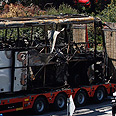
Bulgaria's new interim prime minister said on Saturday he would not initiate any move to impose EU sanctions on Hezbollah, even though the country had implicated the Shiite movement in a bombing at a Black Sea resort that killed five Israelis and a local bus driver.
Marin Raikov did not give a reason for his decision - but it will likely be seen as a concession to Bulgarian opposition groups, who have argued the country could open itself up to more attacks if it takes the lead in blacklisting Hezbollah.
Related stories:
- Bulgaria says Hezbollah behind Burgas bombing
- Iran denies involvement in Burgas attack
- Bulgaria presses EU to toughen stance on Hezbollah
Raikov, a career diplomat, took over at the head of a technocrat administration on Wednesday after mass protests against poverty and corruption by opposition groups and other activists brought down Bulgaria's centre-right government.
He was appointed by the president to maintain market confidence and placate protesters before an election on May 12.
Opposition leaders had also used the protests to denounce what they saw as irresponsible government accusations that Hezbollah was behind last year's bombing that killed five Israelis in the Black Sea resort of Burgas.
"Bulgaria will not initiate a procedure (for listing Hezbollah as a 'terrorist organization')," Raikov told the state BNR radio station. "We will only present the objective facts and circumstances and let our European partners decide."
Last month, then-interior minister Tsvetan Tsvetanov said three people were involved in the bombing and an investigation suggested they had links to Hezbollah.
Last week, the European Commission said the EU would consider imposing sanctions on Hezbollah but did not yet have sufficient evidence of its activities in Europe to make a decision.
No one was immediately available in Brussels to comment on what impact Raikov's comments would have on the bloc's broader stance. All 27 member states would have to agree to any sanctions to come into force.
Israel also has stepped up lobbying in Brussels and Paris, calling on European governments to follow the United States in listing Hezbollah as a "terrorist organization" and impose financial sanctions on it.
Many European governments are wary, arguing that sanctions could destabilize Lebanon's fragile coalition government, which includes Hezbollah, and compound regional tensions.
- Receive Ynetnews updates
directly to your desktop















